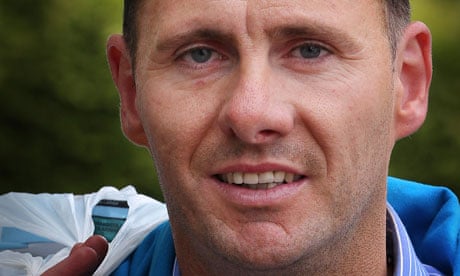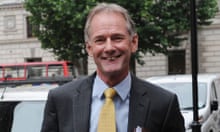The names of 28 News International employees appear in notebooks belonging to Glenn Mulcaire, the private investigator who worked for the News of the World, the Leveson inquiry into press standards heard on its first day at London's high court.
Lord Justice Leveson's inquiry also heard that a "name relating to the Mirror" may also appear in Mulcaire's notes, although this was the subject of further investigation.
Robert Jay QC, counsel for the inquiry, told the high court that "at least 27 other News International employees" are named in Mulcaire's paperwork, as well as former News of the World royal editor Clive Goodman, who was jailed for phone hacking along with the private investigator in January 2007.
Jay also told the inquiry, which began formal hearings at the high court on Monday: "The inquiry is beginning to receive evidence to indicate that phone hacking was not limited to that organisation [News International]."
He said the number of News International names and the scale of the activity indicated there was a culture of phone hacking at the company. "Either management knew what was going on at the time and therefore, at the very least, condoned this illegal activity," he said, or there was "a failure of supervision and oversight".
Mulcaire received a total of 2,266 requests from News International journalists, Jay said, 2,142 of which were made by four unnamed reporters. The most prolific of them made 1,453 of those requests.
A total of 690 audio tapes were also recovered from Mulcaire's office, Jay revealed, and there was a record of 586 recordings of voicemail messages intended for 64 individuals. The evidence was seized by Metropolitan police officers during a raid in 2006.
Mulcaire's 11,000 pages of notes mentioned 5,795 names, he confirmed, who could be potential phone-hacking victims.
Jay also said the inquiry had seen documents that suggest Mulcaire was hacking into phone messages ago as early as May 2001.
It had been thought until today that the earliest phone hacking by Mulcaire occurred in 2002. The new date is potentially significant because it falls before the 9/11 terrorist attacks.
It has been alleged that News International instructed private investigators in the US to target relatives of the victims of the 9/11 attacks, although no proof has so far emerged that this took place.
The Sun is also named in Mulcaire's notes, Jay said. Jude Law had cited the Sun along with its former sister paper the News of the World in his civil case against News International, although the case against the Sun is unlikely to be heard until the end of next year.
Several public figures are believed to be preparing civil cases against the Daily Mirror, but none have so far come to court.
The paper's publisher, Trinity Mirror, continues to insist that its journalists operate within the law and follow the Press Complaints Commission's code of conduct.
A Trinity Mirror spokesman said the company has "no knowledge of ever using Glenn Mulcaire".
Trinity Mirror insiders added that they did not know the identity of any Daily Mirror journalist named in the Mulcaire notes, or whether they still worked for the company. It is understood that Trinity Mirror is writing to teh inquiry to find out more.
Jay said the Mulcaire notes showed a "thriving cottage industry" and the "scale of activity gives rise to the powerful inference that it must have occupied Mulcaire full time".
Outlining the vast remit of the inquiry, Jay described a "root and branch" investigation of the press that would not be cowed by the powerful range of institutions in the media.
He said the inquiry would consider granting "protected measures" to whistleblowers who were afraid of criticising their employer or speaking truthfully about press ethics.
The inquiry will not be limited to phone hacking, Jay said, adding that Leveson was keen to learn about all "unlawful and unethical" newsgathering methods, including subterfuge and blagging.
The former News of the World undercover reporter, Mazher Mahmood, has submitted written evidence and will give oral evidence to the inquiry at a later date, Jay said.
Opening the hearing, Leveson said he had "absolutely no wish" to stifle freedom of speech and expression, and that the inquiry would monitor media coverage to see if it appears that anyone who speaks out is being "targeted adversely".
This article was amended on 15 November 2011. The original said the inquiry heard the words "Daily Mirror" may appear in Glenn Mulcaire's notebooks. This has been corrected to a "name relating to the Mirror".
To contact the MediaGuardian news desk email editor@mediatheguardian.com or phone 020 3353 3857. For all other inquiries please call the main Guardian switchboard on 020 3353 2000. If you are writing a comment for publication, please mark clearly "for publication".


